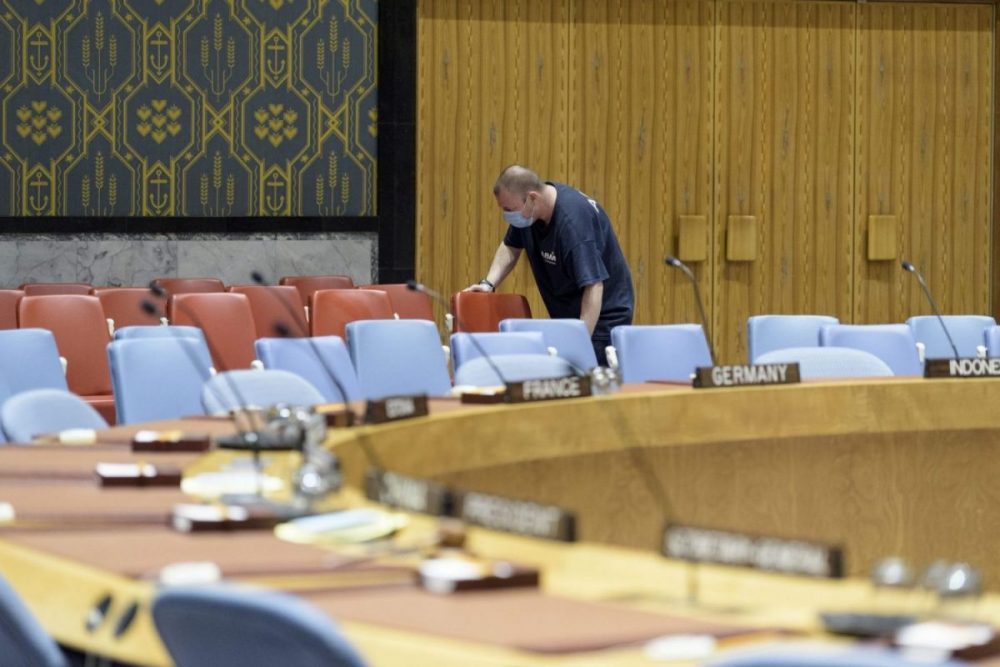UN Security Council elections 2020: eyes on the prize

As election season descends on the United Nations headquarters in New York, the most notable vote is for non-permanent membership of the UN Security Council for 2021–2022. Membership of the council, the paramount body for multilateral crisis management, is prestigious and it’s fiercely contested by member states. Opportunities are limited.
While the UN Charter confers permanent membership on the privileged ‘P5’ (China, France, Russia, the UK and the US), the remaining 188 members have to jockey to fill the 10 non-permanent seats for two-year terms. And while the Covid-19 pandemic has forced candidates to mount virtual campaigns and changed the mode of balloting, the global interest in council membership remains a constant.
Seven members have nominated for the five available seats and voting is set to begin on Wednesday (New York time). The successful candidates will join the P5 on the council, together with elected members Estonia, Niger, Saint Vincent and the Grenadines, Tunisia and Vietnam, which will continue their two-year terms in 2021. The non-permanent seats are distributed across regional groups to achieve equitable geographic representation. Three non-permanent seats are allocated to Africa, one of which is subject to election every even calendar year and the other two every odd calendar year.
This year, Djibouti and Kenya are contesting the one African seat. Canada, Ireland and Norway are contesting the two ‘Western European and others group’ seat. The WEOG seats are subject to election every even calendar year. India is running unopposed for the one Asia–Pacific group seat. Mexico is also unopposed for election to the one seat for the Latin American and Caribbean group. The Eastern European group seat is elected every second year and is held by Estonia until the end of 2021.
Unusually, the African group is presenting a contest. It typically manages a rotation scheme whereby candidates are endorsed by the African Union to allow a ‘clean slate’ for election by the UN membership. However, this year Djibouti has challenged the African Union’s endorsement of Kenya.
In WEOG, contests are the norm. There’s little appetite for a rotation scheme that would require some WEOG members to serve less frequently than they usually do.
Australia is part of WEOG, whose members share broadly similar political values and levels of economic development. Many are in the G20. WEOG is therefore important to Australia as a cohort for cooperation across the UN to project common positions. Australia will also be observing WEOG races closely to inform its own candidacy for the Security Council’s 2029–2030 term.
All candidates, even those unopposed in their regional groups, must be formally elected to the council, which requires the votes of at least two-thirds of the UN membership present. At least 129 votes are required if all 193 members vote. Candidates traditionally campaign to gather the requisite support. (See my 2017 special report for ASPI, Elections at the UN: Australia’s approach, for a look at the campaign process.)
The UN headquarters has been closed since mid-March. To ensure the election could take place in June, the General Assembly decided on a process that accommodates the restrictions on large gatherings. It means we’ll miss the typically dramatic backdrop of the election—the buzz of a full hall anticipating the contest, the energy of the delegations lobbying and the emotions when the results are announced.
This year, members will cast their ballots during allocated time slots in the hall. The assembly president will then circulate the results. If no candidate wins, the president will advise the date of a further secret ballot. The UN will broadcast the voting live.
Article 23 of the UN Charter stipulates that members should consider candidates’ contributions to the maintenance of international peace and security and other UN goals. Each candidate uses their campaign to highlights their achievements and priorities, reflected this year in the Security Council 2020 election debates and Security Council report. Those priorities not only align with the candidates’ foreign policy interests but also are designed to appeal to UN members.
As always, Australia has an interest in the outcome as it pursues a rules-based international system for setting norms to regulate states’ conduct. The Department of Foreign Affairs and Trade recently recommended that Australia strengthen its engagement with multilateral bodies, including the UN, for this purpose. Having like-minded countries on the Security Council helps reinforce the norms that Australia subscribes to, and having friends on the council offers opportunities for cooperation.
Undoubtedly, Australia would like to see Canada succeed in the WEOG ballot. Australia and New Zealand formally coordinate with Canada across the UN agenda in the ‘CANZ’ group, which recognises our largely compatible policy settings and expands our coverage of the broad UN agenda. Australia would benefit from greater input to Security Council deliberations and insights on its decision-making through Canada’s membership.
Australia would be comfortable with the election of either Norway or Ireland given our constructive bilateral relationships and common position on goals including peace and security, human rights and development. We would also have a conduit to the council through either country.
It’s unlikely that the changeover of five non-permanent members will cure the longstanding divisions among the P5, particularly the US and Russia and China. Those divisions have most recently and disturbingly prevented a council response to the pandemic, notwithstanding its implications for international peace and security.
But despite these dynamics, non-permanent members can still influence outcomes by building bridges to secure the P5’s agreement for initiatives that would otherwise fail because of the animus between P5 members. They can act as power brokers to secure buy-in from the broader membership to council decisions. And their votes for proposed council resolutions are integral for adoption.
This was the experience when Australia, Jordan and Luxembourg banded together as fellow non-permanent members in 2013 to secure consensus for Security Council resolution 2118 addressing the humanitarian crisis in Syria.
It pays to have friends on the council and DFAT will be eagerly awaiting the election results.